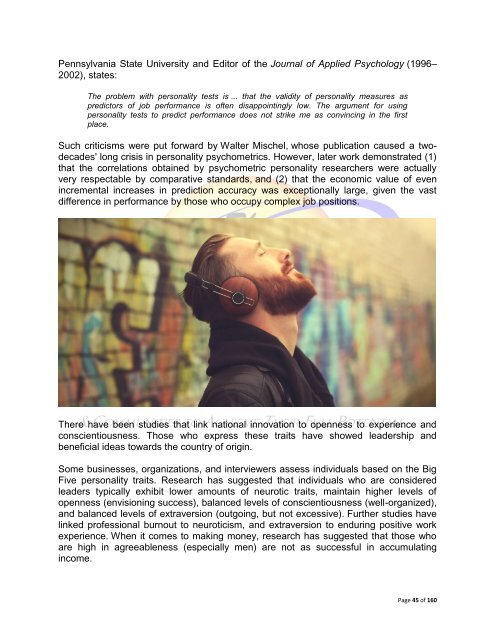The Gift of Introversion
The Gift of Introversion
The Gift of Introversion
You also want an ePaper? Increase the reach of your titles
YUMPU automatically turns print PDFs into web optimized ePapers that Google loves.
Pennsylvania State University and Editor <strong>of</strong> the Journal <strong>of</strong> Applied Psychology (1996–<br />
2002), states:<br />
<strong>The</strong> problem with personality tests is ... that the validity <strong>of</strong> personality measures as<br />
predictors <strong>of</strong> job performance is <strong>of</strong>ten disappointingly low. <strong>The</strong> argument for using<br />
personality tests to predict performance does not strike me as convincing in the first<br />
place.<br />
Such criticisms were put forward by Walter Mischel, whose publication caused a twodecades'<br />
long crisis in personality psychometrics. However, later work demonstrated (1)<br />
that the correlations obtained by psychometric personality researchers were actually<br />
very respectable by comparative standards, and (2) that the economic value <strong>of</strong> even<br />
incremental increases in prediction accuracy was exceptionally large, given the vast<br />
difference in performance by those who occupy complex job positions.<br />
<strong>The</strong>re have been studies that link national innovation to openness to experience and<br />
conscientiousness. Those who express these traits have showed leadership and<br />
beneficial ideas towards the country <strong>of</strong> origin.<br />
Some businesses, organizations, and interviewers assess individuals based on the Big<br />
Five personality traits. Research has suggested that individuals who are considered<br />
leaders typically exhibit lower amounts <strong>of</strong> neurotic traits, maintain higher levels <strong>of</strong><br />
openness (envisioning success), balanced levels <strong>of</strong> conscientiousness (well-organized),<br />
and balanced levels <strong>of</strong> extraversion (outgoing, but not excessive). Further studies have<br />
linked pr<strong>of</strong>essional burnout to neuroticism, and extraversion to enduring positive work<br />
experience. When it comes to making money, research has suggested that those who<br />
are high in agreeableness (especially men) are not as successful in accumulating<br />
income.<br />
Page 45 <strong>of</strong> 160

















